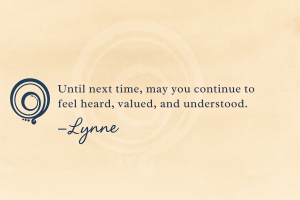Dear Therapist,
My mind doesn’t slow down, especially at night when I’m trying to sleep. I keep thinking about everything that needs to be done for my family, my job, myself or any other thing on my to-do list. I’m so tired because it takes forever to fall asleep, and if I wake in the middle of the night, I can’t get back to sleep. Is this anxiety? What can I do to stop this continuous loop?
— Sleepless and Stuck in My Head
Dear Sleepless,
You’re not alone, what you’re describing is a common experience for many people whose minds struggle to “power down.” I’ve certainly been a victim of the same thing when life is busier than usual and I’m afraid to forget things I need to get done. When we finally lie still, our brains often see it as the perfect time to process the day, anticipate tomorrow, or revisit every unfinished thought. While this can feel like anxiety, it may also be your nervous system’s way of staying in “problem-solving mode” long after the day has ended.
Sleep is essential for our wellbeing and without it we can find ourselves experiencing a variety of side effects due to the lack of proper rest. Some of those symptoms range from: daytime fatigue, trouble making decisions, difficulty managing emotions, slower reaction time, forgetfulness, etc.
🧠 Why it Happens
Your mind is conditioned to be productive to keep track, plan, and protect. At night, without distractions, those thoughts can rush in unchecked. If your body is tense or your brain is overstimulated (from caffeine, screens, or stress hormones like cortisol), sleep becomes even harder to reach. Over time, this cycle reinforces itself, your brain begins to expect wakefulness at bedtime.
🌙 How to Calm the Loop
Here are a few strategies that can help:
Schedule a “Worry Window” or do a “Brain Dump.”
Set aside 10–15 minutes earlier in the evening to write down everything on your mind, tasks, worries, reminders. Close the notebook and tell yourself: I’ll return to this tomorrow.” This signals your brain that there’s a plan in place. You might even keep the notebook in your nightstand in case you wake in the middle of the night and the mind starts up again. You can do another “brain dump” if needed or tell yourself, “I’ve already made sure to write this down so I won’t forget.” Or, “This is not a useful time for me to be thinking about this now. I will return to it during the day.”
Create a Wind-Down Routine.
Think of it like landing a plane, not an abrupt stop. Dim lights, turn off screens, and engage in something calming (stretching, journaling, reading something gentle) for 30 minutes before bed.
Use Apps or Devices Geared for Sleep.
Sometimes it can be helpful for the brain to have a place to go or certain sounds can help signal it’s time for rest/sleep. On Headspace or similar apps, there are sleep meditations or stories. There’s one I have used as part of my sleep routine, “Nothing Much Happens.” It’s a collection of stories narrated by the author in a soothing voice where basically nothing much happens but it gives your brain a place to go, away from the to-do lists, worries, etc. Another option is to invest in Hatch Restore or similar products. This allows you to have a customizable routine to wind down and move into a restful sleep. It also has a nice alarm I have grown accustomed to using where the lights and sounds gently wake you just as they do when cuing you for bedtime.
Try Body-Based Grounding.
Focus your attention on your breath or do a body scan, noticing tension and intentionally releasing it. Apps like Calm or Insight Timer offer guided meditations designed for sleep. Additionally, progressive muscle relaxation is another great tool to use at bedtime as well.
Be Mindful of Caffeine, Alcohol, and Screen Time.
These can all delay the body’s natural sleep signals. Even small changes, like avoiding caffeine after 2 p.m. or silencing notifications an hour before bed, can help.
If it Persists, Seek Support.
Chronic sleep difficulty can be a sign of anxiety or stress overload. Therapy can help you learn to regulate your nervous system and identify deeper triggers behind your racing thoughts.
I’ve linked some resources that I mentioned above for you to check out here..
Remember, rest is not a reward for finishing your list, it’s a need.
Your mind deserves a chance to rest just as much as your body does.
I hope these tips help you turn your brain off at bedtime and wish you a peaceful night’s rest 😴

This column is for informational purposes only and is not a substitute for professional mental health care. Reading this does not create a therapist-client relationship. If you are struggling with anxiety or another mental health concern, please reach out to a licensed professional in your area for support. If you are in crisis or thinking of harming yourself, please call 988 in the U.S. or go to your nearest emergency room.